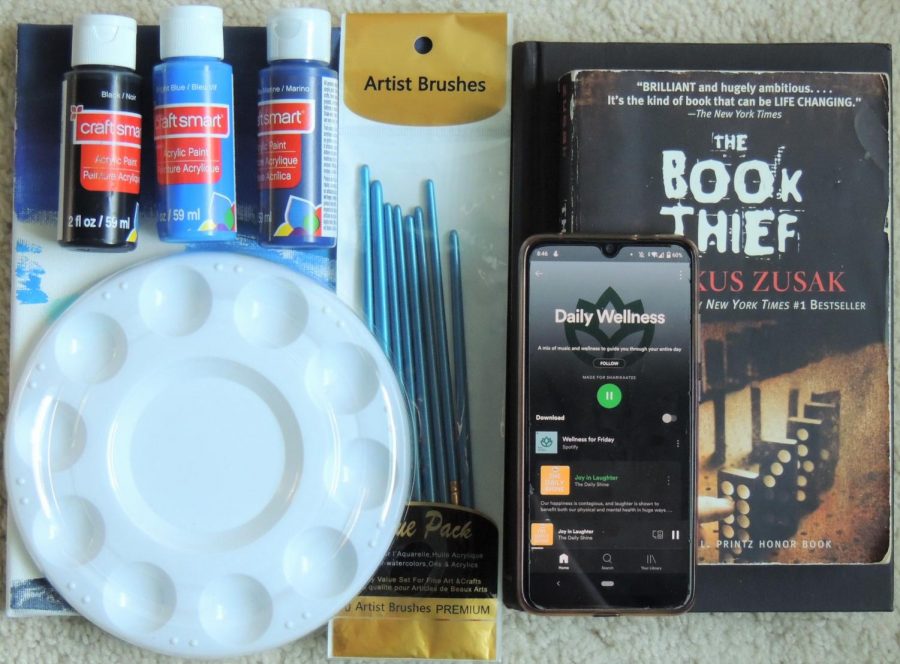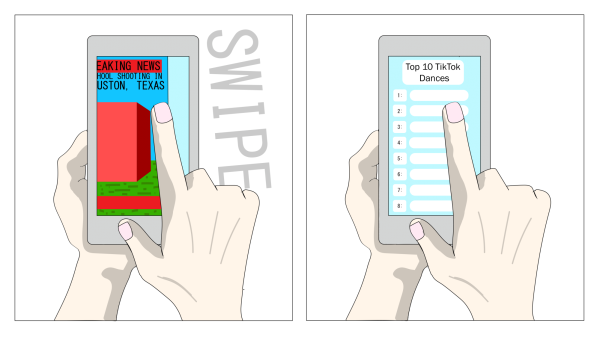Problematic, not “productive”
photo by Sharika Khondaker
Depending on how someone defines productivity, activities like painting, reading or listening to a wellness podcast can easily qualify as productive. Being “productive” is not strictly limited to schoolwork.
I can not believe I was so unproductive today.
When these words ring through your head, everything you had done up to that point becomes insignificant. The walk outside, making dinner, reading a book and even that sweet three-hour nap you took earlier amounts to nothing compared to the work piling up on your desk — work that has yet to be finished.
There goes another wasted day.
With only 24 hours in a day, people find themselves filling their schedules with boundless tasks to keep busy. Completing work, checking tasks off on a to-do list, and maximizing time and efficiency feels good because it feels “productive.” However, constantly trying to meet productivity goals can lead to overworking, severe burnout and increased stress levels. This eventually leads to a lack of motivation.
Trying to qualify your worth based on how “productive” you are creates a volatile state of mind. Someone is either productive or they are not, with no place to rest in between. We have let productivity consume our lives; it should not have this much power over someone’s well-being.
At its core, the word “productivity” is not deliberately harmful. It is defined as the state of producing something; in the workplace, it is measured by how much output someone creates. But it is not helpful to look at the basic definition of the term when the real problem comes from its connotations; with no connotation of its own, there has to be a positive or negative value assigned for it to be meaningful.
The issue with the word “productivity” is simply how it is used when talking about the quality of work. Instead of saying what specific tasks they have accomplished and why they were meaningful, most say that they were productive or unproductive that day. For a student, things like attending a two-hour practice for their extracurricular and cleaning their room is great, but failing to do any homework makes the day feel unproductive.
Saying that someone is “being productive” does not actually mean anything. Using a “to be” verb makes productive a subject; it just exists as a state of being. In no way does it reference what someone is actually working on: are they writing an essay, creating a piece of art or learning how to memorize the digits of pi? Because of its vagueness, no one besides the person completing the task knows.
The truth is, everyone has a different definition of productivity. Technically, anything could be considered productive. Someone could find productivity in self-care, while others find it learning a new skill — it all depends on the way they look at it. Unfortunately, society emphasizes the type of productivity that is confined to schoolwork or a job, and most people believe anything outside of that realm is just an extra hobby to try in your free time.
Hustle culture and social media have contributed to this perception of productivity: people need to feel busy to feel accomplished. Scrolling through social media, it looks like everyone is always working as they share their successes and achievements with the rest of the world. Combined with the thousands of “a day in my life” and “tips to increase productivity” videos plastered all over YouTube, this creates an internet culture where everyone is constantly working, and the pressure can be detrimental.
Not only can this deteriorate someone’s self-worth, but it can be hard to escape that cycle of constant negative thinking and feeling unmotivated to even start work again. According to educationdata.org, 42% of students said that staying motivated was an issue when it came to completing online schoolwork during the pandemic. When the world feels frozen in time and everyone is stuck inside their house, it can be hard to complete online work, especially now that we are constantly connected to our screens for school or jobs.
Here, many find themselves stuck in the rut of unproductivity: to be in a limbo of wanting to meet personal or work-related goals while also wanting to do nothing is an absolute nightmare. The serious burnout and lack of motivation is horrifying. Doing nothing is worse than working on even a little task, yet somehow hours slip away while staring at a phone or computer, contemplating what to do.
Even on vacation days where they can enjoy their time, people scramble to find any kind of work because of their workaholic tendencies. They have overworked themselves so much that they do not know what to do with themselves, and guilt starts to build up for just relaxing. The constant worry and panic of not working remains present, and could easily ruin the day off. This is extremely toxic.
Instead of relying on the word “productive” to describe the tasks someone is working on, get rid of it from your vocabulary and find alternatives. Action verbs like “to produce, to accomplish, to create and to achieve” create a positive connotation around working and abandon the gutter of discouragement — this is the first step into reframing the essence of productivity.
Your donation will support the student journalists of Hagerty High School. We are an ad-free publication, and your contribution helps us publish six issues of the BluePrint and cover our annual website hosting costs. Thank you so much!







